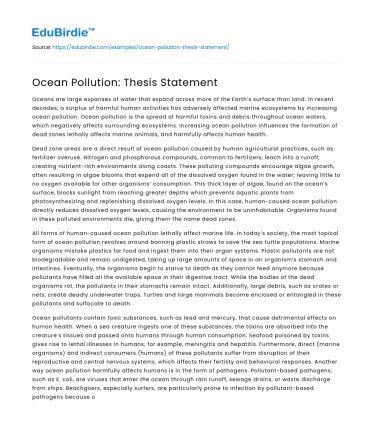Oceans are large expanses of water that expand across more of the Earth’s surface than land. In recent decades, a surplus of harmful human activities has adversely affected marine ecosystems by increasing ocean pollution. Ocean pollution is the spread of harmful toxins and debris throughout ocean waters, which negatively affects surrounding ecosystems. Increasing ocean pollution influences the formation of dead zones lethally affects marine animals, and harmfully affects human health.
Dead zone areas are a direct result of ocean pollution caused by human agricultural practices, such as fertilizer overuse. Nitrogen and phosphorous compounds, common to fertilizers, leach into a runoff, creating nutrient-rich environments along coasts. These polluting compounds encourage algae growth, often resulting in algae blooms that expend all of the dissolved oxygen found in the water; leaving little to no oxygen available for other organisms’ consumption. This thick layer of algae, found on the ocean’s surface, blocks sunlight from reaching greater depths which prevents aquatic plants from photosynthesizing and replenishing dissolved oxygen levels. In this case, human-caused ocean pollution directly reduces dissolved oxygen levels, causing the environment to be uninhabitable. Organisms found in these polluted environments die, giving them the name dead zones.
Save your time!
We can take care of your essay
- Proper editing and formatting
- Free revision, title page, and bibliography
- Flexible prices and money-back guarantee
All forms of human-caused ocean pollution lethally affect marine life. In today’s society, the most topical form of ocean pollution revolves around banning plastic straws to save the sea turtle populations. Marine organisms mistake plastics for food and ingest them into their organ systems. Plastic pollutants are not biodegradable and remain undigested, taking up large amounts of space in an organism’s stomach and intestines. Eventually, the organisms begin to starve to death as they cannot feed anymore because pollutants have filled all the available space in their digestive tract. While the bodies of the dead organisms rot, the pollutants in their stomachs remain intact. Additionally, large debris, such as crates or nets, create deadly underwater traps. Turtles and large mammals become enclosed or entangled in these pollutants and suffocate to death.
Ocean pollutants contain toxic substances, such as lead and mercury, that cause detrimental effects on human health. When a sea creature ingests one of these substances, the toxins are absorbed into the creature’s tissues and passed onto humans through human consumption. Seafood poisoned by toxins gives rise to lethal illnesses in humans; for example, meningitis and hepatitis. Furthermore, direct (marine organisms) and indirect consumers (humans) of these pollutants suffer from disruption of their reproductive and central nervous systems, which affects their fertility and behavioral responses. Another way ocean pollution harmfully affects humans is in the form of pathogens. Pollutant-based pathogens, such as E. coli, are viruses that enter the ocean through rain runoff, sewage drains, or waste discharge from ships. Beachgoers, especially surfers, are particularly prone to infection by pollutant-based pathogens because of their considerable amount of time in direct contact with water, and all its pathogens.
The ocean provides nutrient-rich habitats for thousands of marine organisms. Oceans are a place of natural beauty where people can come to swim, surf, and live mutualistic ally with it. Every citizen bears the responsibility to clean up ocean pollution while marine ecosystems are still recoverable. The effects of ocean pollution can be averted by increasing public awareness about its harmful environmental effects.






 Stuck on your essay?
Stuck on your essay?

